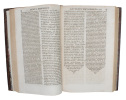SEXTUS EMPIRICUS.
Opera quae extant. Magno ingenii acumine scripti" Pyrrhoniarum hypotyroseon(Greek) Libri III. Quibus in tres Philosophiae partes acerrimè inquiritur, Henrico Stephano Interprete: Adversus Mathematicos, hoc est, eos qui disciplinas profitentur, Libri X... - [THE SCEPTICAL REVOLUTION]
Paris, Abraham Picard, 1621. Folio. Nice mottled full calf binding (ab. 1850) with richly gilt spine and gilt title-labels. Minor wear to extremities. Lower blank margin of first two leaves repaired, far from affecting text, and very neatly restored wormhols to lower blank margin to a number of other leaves leaves, barely visible and also far from affecting text (apert from the index, where it touches a couple of letters). A bit of very light scattered brownspotting. All in all a very nice, clean, and fresh copy. Engraved title-vignette, woodcut ornamental borders and large woodcut initials to first leaves. (22), 521, (41, -Index) pp.
Reference : 51094
The very rare editio princeps of one of the single most important ""opera"" in the history of Western thought, namely the first edition of the original Greek text of the collected works of Sextus Empiricus, a body of writing that came to determine the course of much modern thought, influencing the thought of Bruno, Montaigne, Descartes, and many other pivotal thinkers of the modern era. The present collection of writings constitutes one of the the single most important texts in the history of skepticism, determining the course of modern thought. ""No discovery of the Renaissance remains livelier in modern philosophy than scepticism"". (Copenhaver & Schmitt, p. 338). ""The revived skepticism of Sextus Empiricus was the strongest single agent of disbelief"". (ibid., p. 346). ""As the only Greek Pyrrhonian sceptic whose works survived, he came to have a dramatic role in the formation of modern thought. The historical accident of the rediscovery of his works at precisely the moment when the skeptical problem of the criterion had been raised gave the ideas of Sextus a sudden and greater prominence than they had ever before or were ever to have again. Thus, Sextus, a recently discovered oddity, metamorphosed into ""le divin Sexte"", who, by the end of the seventeenth century, was regarded as the father of modern philosophy. Moreover, in the late sixteenth and seventeenth centuries, the effect of his thoughts upon the problem of the criterion stimulated a quest for certainty that gave rise to the new rationalism of René Descartes and the ""constructive skepticism"" of Pierre Gassendi and Martin Mersenne."" (Popkin, p. 18).""The revival of ancient philosophy was particularly dramatic in the case of scepticism. This critical and anti-dogmatic way of thinking was quite important in Antiquity, but in the Middle Ages its influence faded [...] when the works of Sextus and Diogenes were recovered and read alongside texts as familiar as Cicero's ""Academia"", a new energy stirred in philosophy"" by Montaigne's time, scepticism was powerful enough to become a major force in the Renaissance heritage prepared for Descartes and his successors."" (Copenhaver & Schmitt, pp. 17-18). The work appeared in two variants, one printed in Paris by the Chouet brothers, and the present printed by Picard, also in Paris. No precedence between the two has been established, but the present Picard-printing is the scarcest.
Bookseller's contact details
Herman H. J. Lynge & Son
William Schneider
Silkegade 11
1113 Copenhagen
Denmark
+45 33 155 335
Payment mode
Sale conditions
All items may be returned for a full refund for any reason within 14 days of receipt.
 Write to the booksellers
Write to the booksellers



